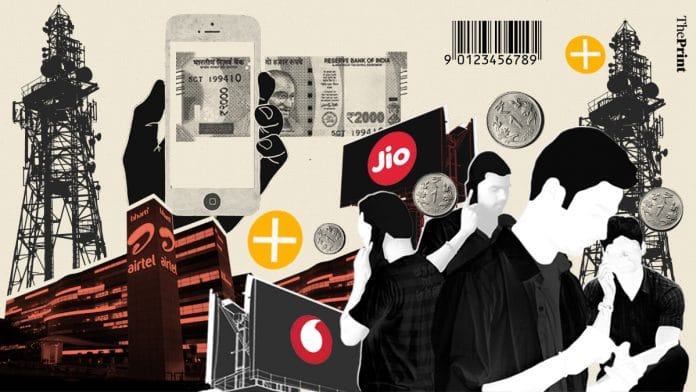India’s debt-ridden telecom players Vodafone-Idea and Bharti Airtel, along with Reliance Jio have announced tariff hikes of 14-67 per cent to overcome losses incurred due to a prolonged price war. The industry has been in crisis since the 2008 2G scam. Experts say the Supreme Court’s ruling on AGR dues to the government can harm both telcos and customers.
ThePrint asks: Jio, Airtel, Vodafone hike rates: Indians being punished by policies made after 2G scam?
Can’t ascribe hike to post-2G scam policies. Misuse of unlimited plans forced telcos to make decision
 Kunal Bajaj
Kunal Bajaj
Telecom analyst
It would be difficult to say that Indians are being punished by telecom policies made after the 2G scam. We can’t ascribe everything to policy decisions. Looking at the last three years, there has definitely been a digital revolution in India because of the introduction of unlimited data plans.
The 40 per cent rate hikes this time are only for unlimited plans. For general plans (like 1GB and 2GB packages), the price points have not increased dramatically. It is the misuse of these unlimited plans that has compelled the telecom companies to make this decision. This issue is also not specific to India.
This move is a win-win deal for all parties, including the telecom industry, consumer and even the government. Without this hike, the industry will not have the infrastructure to live up to consumers’ expectations. Even if tariffs were free, it would not help anyone because there would be no money to invest in other sectors and services, ranging from something as basic as cab sharing companies to net banking.
If the network is just for namesake and doesn’t provide quality services, what would be its use? These hikes are inevitable and are needed to create stable and robust industries.
We are seeing the consequence of lack of competition. Modi govt must adopt pro-market regulatory position

Nitin Pai
Director, Takshashila Institution
Government decisions and the actions of the Telecom Regulatory Authority of India have resulted in a decline in market competition within the telecom industry over the last 15 years. What we are seeing is the inevitable consequence of lack of competition. It is the payback for successive governments’ intervention in pricing policies, license conditions and arbitrary changes to the rules of the game. India’s telecom policy was not committed to market competition.
The question now is whether there can be adequate competition in the industry going forward with only three major telecom players. If they all provide poor quality services, there is little that the consumer can do. An important argument for the government to own a telecom company was to prevent such things from happening, yet BSNL today is hardly in a position to provide a price floor.
The task before the government moving forward is to adopt a pro-market (rather than pro-business) regulatory position, and promote competition. Of course, this will be hard, but unless TRAI acts more like a competition watchdog, both the industry and the consumer will suffer.
2G scam ballooned debt payments for telcos but consumers have not been punished for it

Rajan S Mathews
Director general, Cellular Operators Association of India
The tariff hike by some telecom players will not be a punishment for Indian consumers. The 2G scam has had its own impact. It ballooned debt payments for the telecom industry. However, there is no reason for the consumer to feel punished by these developments. Despite the exacerbated debt problem among telecom companies, consumers didn’t face any price hike for years. The Indian consumer has had a feast when it comes to tariffs because the country offers the lowest data rates in the world.
I don’t think that this price hike is going to hurt the consumer either. This is simply because of the sheer amount of data Indians use, which is more than what people in the United States and China combined consume.
Consumers in India would have to pay for it at some point in order to enable the telecom industry to enhance the quality of services being provided. Further, I think that this debt problem became even more inevitable after the Supreme Court’s ruling on adjusted gross revenue (AGR).
Current state of telcos due to India’s poor handling of spectrum. This was also underlying cause of 2G scam

Mahesh Uppal
Telecommunication Regulation Consultant
Indian consumers are not being punished for policies made by the government after the 2G scam. The current state of telecom markets is mainly due to India’s poor handling of spectrum. This was also the underlying cause of the 2G scam.
The Department of Telecommunications (DoT) has an inconsistent approach to allocation and pricing of spectrum. In the 2G scam, the DoT gave away spectrum to several dubious players at a price below the market value. The Supreme Court intervened and ordered auctions. That was the right thing to do. However, the DoT has designed auctions with the objective of maximising its own revenues. Companies ended up bidding excessive amounts for spectrum. The bids turned out to be unsustainable especially in the light of crash in prices triggered by free telecom services offered by Jio over an extended period.
A second reason is that the TRAI has failed to create consistent rules for interconnection usage charge (IUC). The reduction in IUC made it cheaper for Jio to access rival networks and to lower prices for its users. To survive in the market, the rivals had no option but to match Jio’s low prices. The net result is the all-round fall in revenues of telecom companies and the desperate attempts to recoup them through higher user charges.
This price hike won’t hurt the consumer since they have already sampled the product. It would be difficult for them to give up the low-price addiction.
This hike in tariffs should provide a fillip to India’s digital revolution

Rajat Mukarji
Independent consultant
Indian consumers have benefited immensely from government policies that have been introduced in the last few years to resuscitate the telecom sector. There should be no doubt that India has managed to catch up with the rest of the world in terms of user experience in the telecom. Further, it is important to note that India has the highest usage of data in the world with the lowest possible rates.
But Indians deserve a far higher quality of telecom services than what they are being offered currently. We can only hope that this will be tackled and resolved after the price hikes in tariffs come into effect. On the question of whether these price hikes could potentially hurt India’s digital revolution, I feel that the revolution needs the backing of a stable telecom industry that is not running in losses. A bleeding industry, which is the current situation in the country, seems to be incapable of doing the same. This hike in tariffs should hopefully provide a fillip to the country’s digital revolution.
If it weren’t for these price hikes, the telecom sector would have died and taken the entire Indian economy down with it.
Also read: Vodafone Idea, Airtel sending out distress signals. But they are only paying for their sins
By Kairvy Grewal, journalist at ThePrint







2 G scam was a total hoax. A politically motivated campaign which served its purpose. Rather it was surprising that not an iota of evidence of money trail could be produced in the court. But telecom and fdi suffered immensely because of that.
Normally one would expect TRAI to be deeply invested in the health of the industry.
As I remember 2 scam is not really has taken place. Then what’s the problem with IdeaVodafone or Airtel . If Jio’s birth has taken place after the Same then why side effects of it .
Consumers should pay a fair price for mobile calls / data and air travel. Also for products they order from e commerce sites. Pricing patterns where businesses bleed money harm them in the long run, because they damage the economy. Create mounds of NPAs. 2. As far as the telecom industry is concerned, apart from predatory pricing, led by Reliance Jio, the government’s bite is too large. Whether it is spectrum, licence fees, other charges, its consolidated share of gross revenues should be sustainable for all stakeholders. 3. I am certainly not a fan of A Raja, but his transgressions are now history, whitewashed by a magnanimous court verdict. Each time the government confronts a problem, it should stop looking to the past, fishing for alibis and excuses.